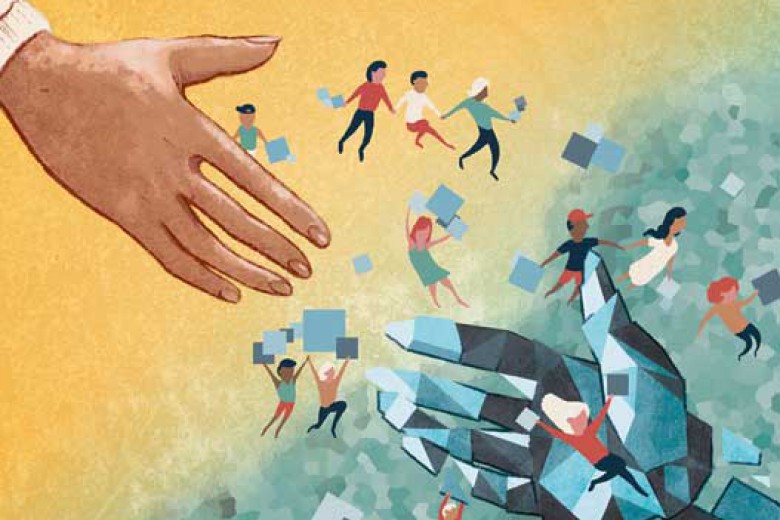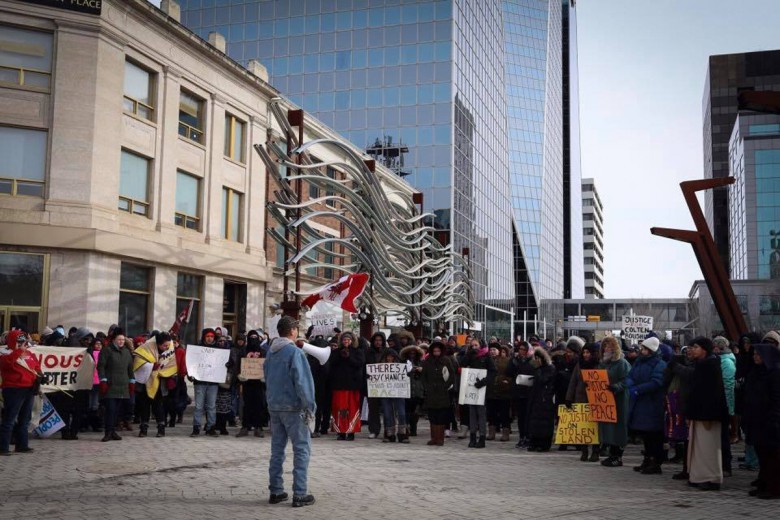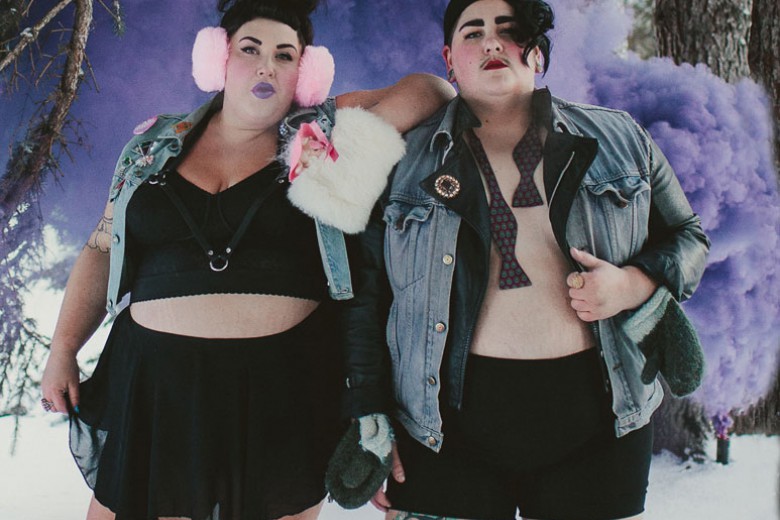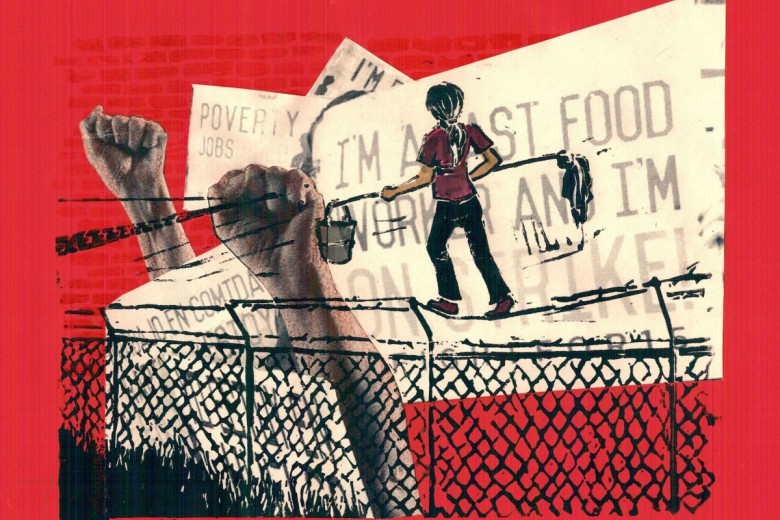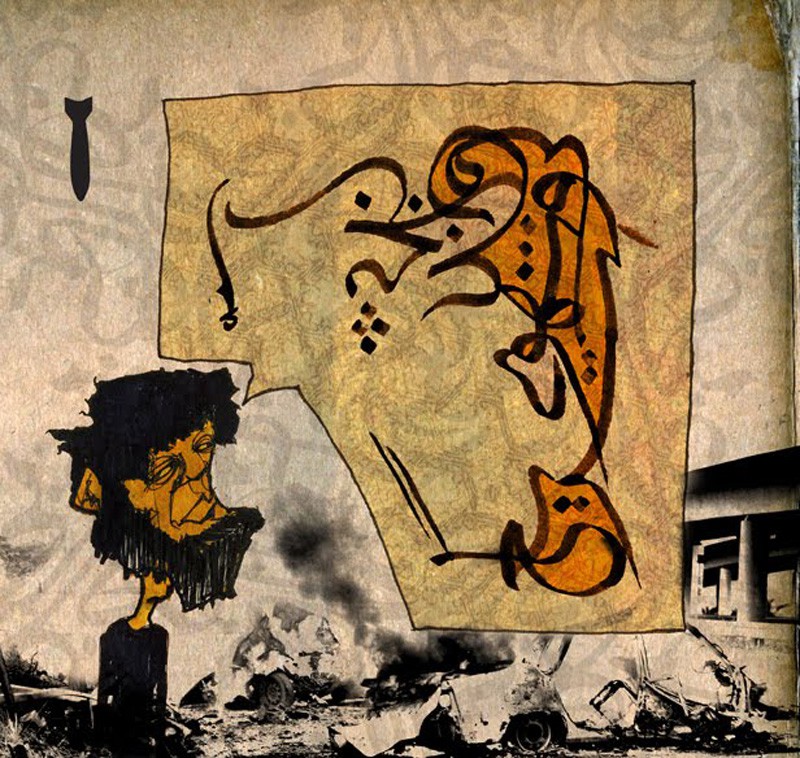
One icy evening in December 2007, a friend and I walked through a large Toronto mosque collecting signatures for a petition to grant members of the Toronto 18 — a group of young Muslim men arrested and imprisoned under allegations of terrorism in June 2006 — the legal rights of regular prisoners in the maximum security facility where they were being detained. Many of the men had been kept in solitary confinement since their arrest more than a year prior, and reports of routine humiliation, denial of access to prayer facilities, and targeted discrimination had begun to reach the mainstream media. The petition was put together by an ad hoc coalition of the group’s family members and community organizers, and cautiously abstained from commenting on innocence or guilt, instead requesting solely that they be treated like all other prisoners in the facility. Yet when approaching members of this mosque, many of whom I grew up alongside, I was surprised to be met with significant hesitation. While many signed willingly, grateful for the reminder that the devotional space was not isolated from its socio-political context, others did not. “I’m not sure” “ one young woman trailed off. “Let me think about it” muttered another, visibly uncomfortable with the request.
The experience provoked a series of reflections regarding the role of Muslim communities in contemporary debates over “homegrown terrorism” and the “domestic threat” in post-9/11 Canada. With Islam having moved to the centre of North American political discourse since 9/11, Muslim practices, cultural formations, sectarian divides, religious laws and political histories are being publicly scrutinized as never before. Grandiose proclamations of a “clash of civilizations” are now commonplace, as are routine examples of racial profiling, hate crimes, polls documenting shockingly discriminatory public opinions, and inflammatory rhetoric from public figures across the political spectrum. This rise of what has come to be known as Islamophobia is a central part of the global War of Terror and its ideological underpinnings. Progressive responses to these shifts have included important efforts to build solidarity between a range of anti-racist and leftist movements and local Muslim communities. For many who regularly move through both these spaces, the past few years have repeatedly left us defending a homogenized Islam against a public onslaught of imperialist justifications for state intervention. Meanwhile, internal struggles over gendered violence, authority, or discrimination have become sidelined in a world where tropes of the violent Muslim man, the oppressed Muslim woman, or the conservative Middle Eastern scholar deeply underpin this growing global enterprise of racism.
And yet my brief anecdote reminds us that the Muslim community, as diverse in political opinions as it is in cultural and geographic origin, provides no constant and unified response to the violences of Islamophobia around which those of us committed to an ethics of anti-imperialism and justice can come together. How then do we respond collectively to the targeting of Muslims in Canada while remaining accountable to a politics of solidarity? And what does solidarity look like when dealing with troubling accusations of intended terrorism, seemingly uncomfortable ideologies and religious teachings, and competing voices of authority providing very different narratives of community response?
Debunking the story of a tolerant Canada
“The story is not just a story, of course, but is the narrative scaffold for the making of an empire” the story underwrites the expulsion of Muslims from political community, a casting out that takes the form of stigmatization, surveillance, incarceration, abandonment, torture, and bombs.”
— Sherene Razack
Islamophobia has risen sharply around the world since the launch of the War of Terror. While there has not been any known terrorist attack within Canadian borders since 9/11, the highly publicized 2006 arrests of the Toronto 18, coupled with the recent arrests of four Muslim men in and around Ottawa under terrorism charges, have heightened a discourse of fear over the Islamist threat to national security, and also proliferated anti-Islamic sentiments among many Canadians.
Muslims are not alone in experiencing increases in systematic repression. The past decade in Canada has also seen intensified opposition to Indigenous sovereignty struggles and the continued appropriation of Indigenous land and resources; increased imperial interventions and military entrenchments abroad; a massive restructuring of the immigration system at the expense of refugees, migrant workers and prospective immigrants; the criminalization of political dissent, most recently evident in the aftermath of the G20 protests in Toronto; far-reaching cutbacks in social services and non-profit funding; increased centralization and corporatization of mainstream media; vast environmental devastation best encapsulated in Alberta’s tar sands; and broader shifts to the right in the platforms of all three major Canadian political parties. This context provides an important background for understanding the entrenchment of Islamophobia in Canada.
Terrifying threats and homegrown security
“What terrifies in the terrorism arrests announced yesterday in Ottawa is that the Islamists’ call to mass murder, if the accusation is true, was accepted by a McGill University-trained medical doctor who loves hockey and sang on Canadian Idol.”
— The Globe and Mail (Aug 26, 2010)
In August 2010, four Muslim men were arrested under allegations of spearheading a “bombing and terror financing plot” that stretched from Ontario and Quebec into Iran, Afghanistan, Pakistan and the United Arab Emirates. The arrests were the result of a year-long secret investigation, given the atrociously Orientalist misnomer of “Operation Samosa” which involved the RCMP, CSIS, the Canadian Border Security Agency, and various regional police forces coordinated by the Integrated National Security Team (INSET). (Beyond the racist linkage of anti-terrorism operations to an ethnic food item that multicultural Canada is only too happy to consume, samosas, of course, have little culinary history in Tehran or Dubai.) Police have since claimed the discovery of 50 circuit boards built by the men to detonate remote bombs as part of plans to target the federal Parliament. Their plan was allegedly accompanied by a fundraising plot to, as one CTV commentator crudely put it, “raise cash to blow up Canadian soldiers in Afghanistan.” Although three of the men have since been released on bail, the allegations against them have been compared by many to the first arrests made under the expanded provisions of the Anti-Terrorism Act (rushed into the House of Commons immediately after 9/11), those of the Toronto 18.
In June 2006, 17 men (with one later addition) were arrested in a massive performance of state security that involved a series of raids across Greater Toronto, also carried out by INSET, with the co-operation of the U.S. Joint Terrorism Task Force. As the Toronto Star reported, “security at the Brampton court, where [the men] first appeared [after their arrest], looked like something from a movie set: helicopters whirling above, police snipers on the roof and machinegun-toting officers on the ground.” Headlines flashed news of foiled plots to behead the prime minister and blow up parts of Toronto. The sensationalism only increased when the operation was revealed to be the result of a two-year secret investigation complete with two paid informants, Mubin Shaikh and Shaher Elsohemy. Shaikh has since admitted to soliciting police monies to maintain a cocaine habit, and Elsohemy to having been paid approximately $4 million. Both were central to the provision of equipment, finances and moral support for the men’s alleged plotting.
Over four years later, publication bans on the case have been lifted, seven of the 18 men have had their charges stayed, and 11 are serving sentences ranging from a few years to life in prison. Seven of the 18 pled guilty, and the four who chose to go to trial were all convicted — two by jury in the first case of a Canadian jury delivering a verdict over allegations of terrorism. In my conversations with family members, they described arduous years of court appearances marked by intense Islamophobia, with prosecutors citing the Qur’an and traditional Islamic texts to demonstrate individuals’ supposed ideological extremism. After years of being denied bail and losing motions, guilty pleas provided the quickest means to ending the saga and accessing the education, family contact and additional privileges that would come from transfer out of solitary confinement after a guilty sentence (likely to be the eventual result anyway). With the sentencing of the last of the group in October 2010, the Toronto 18 case has quietly receded from critical scrutiny, and the men are set to serve the rest of their lengthy prison sentences as branded extremists.
These two cases are certainly not the only instances of Canadian Muslims charged with terrorism, but they have attracted the most public attention and widespread alarm. Discussions in their aftermath point to an unsettled tension between maintaining Canada’s liberal, multicultural national narrative while upholding the notion of Islamic terrorism as an ongoing global threat that necessitates policing citizens at home and fighting wars abroad. Headlines in the Globe and Mail immediately after the Ottawa arrests in August warned of “A new threat: homegrown and high tech” and “The terrorism arrests’ unlikely suspects.” In the latter article, readers were cautioned that “Even those individuals who seem to be, and may in fact be, well integrated into their communities, may not be immune to the lure of jihad. This is not new to other parts of the world” but it is a shock for Canada.”
Surprise at the technical prowess of the accused is rather laughable — while racist tropes tend to paint accused terrorist networks as backward and rudimentary, full of bearded men hiding in caves, all the Islamist groups at the forefront of global conflict rely heavily on international networks of capital and modern communications technologies. Yet while we speak broadly of the rise of Islamophobia in Canada, the reporter’s assumptions about selective Muslim integration remind us that not all Muslims have been hated, feared or targeted equally. Who, then, bears the brunt of these rising sentiments?
Friendly or fanatic? (and how to tell the difference)
“Unfortunately for the good Muslims, no matter how deep their gratitude to the nation, no matter how ardent their embrace of western civilizational norms, the new anti-terrorism measures continue to make them as equally suspect as the bad Muslims.”
— Sunera Thobani
Mahmood Mamdani’s 2004 text, Good Muslim, Bad Muslim, provides a framework that has become widely cited when discussing the position of Muslims in North America in post-9/11 political discourse. He points to the repeated efforts by leaders to reassure the public that, while some Muslims may be terrorists, the vast majority are not. However, Mamdani argues, unless and until proven to be “good” this discourse presumes every Muslim to be “bad.” While these judgments refer primarily to political identities, they further align with various religious markers and are most commonly seen in the differentiation between the good as the peace-loving, patriotic and often adamantly secular, and the bad as those prone to varying degrees of sexism, homophobia, violence and fanatic hatred for Western civilization, often also marked by full beards, face-veils or traditional (unassimilated) clothing. Canada is no stranger to these divides, as partly attested to by constant public statements from Muslim leaders condemning terrorism, calls by Muslim community groups to co-operate with RCMP investigations and report suspicious behaviour of other community members, or Muslim organizational offers of “cultural sensitivity training” to police and intelligence officials. All of these actions seek to secure membership in the group of the good, while reminding us that the bad are still a palpable threat about which something needs be done.
And yet, this boundary is shifting. Racial profiling has left few untouched, including non-Muslims of Middle Eastern or South Asian descent. The recent Ottawa arrests included two professionally educated doctors, one of whom auditioned on Canadian Idol and was an avid hockey fan — quintessential markers of Canadianness, albeit alongside a thick beard and traditional clothing. The unease expressed in the Globe editorial quoted above reveals how the arrests have blurred seemingly identifiable lines that distinguish the good from the bad. Similarly, the recent controversy over a proposed Islamic community centre a few blocks away from New York’s ground zero site has resulted in the demonization of a religious leader who has worked with both the Bush and Obama administrations, conducting training for the FBI and going on State Department-sponsored visits to the Middle East to promote “moderate” understandings of Islam. Imam Feisal Abdul Rauf, leader of the Park 51 project, even sits on the Religious Advisory Committee of the Council on Foreign Relations, a pro-empire think tank with the likes of Dick Cheney, Condoleezza Rice, Paul Wolfowitz and Madeleine Albright among its membership. Rauf may in fact epitomize the good Muslim, and still this has not lessened the racist uproar against him.
It increasingly appears that all Muslims are essentially suspect by virtue of their (presumed) religious identity alone. Yet while some Muslim communities are being infiltrated by state informants, others are celebrated by the government with public spectacles of joint co-operation and a proliferation of government-funded initiatives aimed at “de-radicalizing” Muslim youth, “empowering” the community, or calling for greater “dialogue” across difference. Such contradictions necessitate a closer examination of the idea of a “Canadian Muslim Community.”
Who speaks for the Muslims?
“In the game of terrorism, the terrorists have the upper hand. Because they can hide within the community, they can disappear very, very quickly in some cases.”
—- Michel Juneau-Katsuya, Former CSIS Officer
While a range of Canadian Muslim organizations struggle over claims of authentic representation of the Muslim community, one group has risen to particular prominence in recent years. Although it bears little credibility within organized Muslim spaces outside its own, the Muslim Canadian Congress (MCC) and its affiliated heads have become common sources in mainstream media such as CBC, CTV, the Globe and Mail, the Toronto Sun and the National Post. As a self-proclaimed voice of reason, moderation, tolerance and progressive secularism, the MCC is best known for being the only self-identified Canadian Muslim group that applauds racial profiling and repeatedly raises alarm at the threat “radical Muslims” pose to national security.
Following the Toronto 18 arrests, the MCC issued a statement that commended the RCMP and expressed its “relief” at the arrests, but also drew attention to the failures of Bush and Harper’s so-called War on Terrorism and the historic role of the CIA in the formation of Al-Qaeda and the Taliban. In recent years, however, they have dropped this political line entirely in favour of a vicious attack on Muslim community leadership for being neither adequately apologetic nor adequately secular, equating all religious identifications that do not resemble their own dogmatic secularism to “Islamic extremism.” After the Ottawa arrests in 2010, the MCC again applauded the RCMP, but this time added that “unless and until the Muslim leadership in Canada steps up to the plate and declares unequivocally that the doctrine of armed jihad is outdated and inapplicable, and that anyone propagating jihad in Canada is a national security risk, the latest terror-related arrest in Ottawa will not be the last one.” An article in the Ottawa Citizen by MCC vice-president Salma Siddiqui and former president and founder Tarek Fatah went as far as to cite a poll of Muslims questioning the guilt of the Toronto 18 to argue that “there could be as many as 100,000 Muslim Canadians who are hostile to Canada and western civilization. A scary number by any measure.” In an interview with CTV, MCC board member Raheel Raza repeated, “I think that this is the litmus test. Those who don’t condemn armed jihad, by default, they’re supporting it.”
The MCC may be among the most Islamophobic organizations in Canada — it consistently calls for the banning of the burqa, raises alarms about the threat of shari’a law coming to Canada, and has vociferously condemned the building of the Islamic community centre in downtown New York (something not a single major U.S. Muslim organization has done). It would be easy to dismiss the organization’s position as the product of a twisted internalized racism or a hunger for the power and opportunities available to those really, really good Muslims in a post-9/11 world. But why, without the support of any other Muslim organization, has the MCC risen to such a prominent position in Canada? It is not simply a product of open discourse and diverse viewpoints, as there is arguably no other Muslim organization that receives the same degree of public space to articulate its views. The MCC represents the height of collaboration with institutionalized discrimination, state surveillance, and the production of Muslims in Canada as “hostile to Western civilization” and therefore ungrateful immigrants uniquely prone to violence and fanaticism, and fundamentally at odds with the supposed cornerstones of modern liberalism: democracy, freedom, and individual rights. Organizations like the MCC are thus central to the ongoing reproduction of the “Muslim threat” alongside grandiose state operations and exaggerated headlines. Together with our critiques of state and corporate power, then, we must refuse the blind privileging of those who claim to represent marginalized communities while in fact they have constituted themselves as integral players in the consolidation of empire.
Holding the state — and ourselves — accountable
“We know, of course, there is really no such thing as the “˜voiceless.’ There are only the deliberately silenced, or the preferably unheard.”
— Arundhati Roy
It is impossible to know the realities behind the Toronto 18, the recent Ottawa arrests, or the countless other alleged terrorists who have been followed, detained, harassed, tortured, deported or arrested across Canada. It is just as difficult to grapple with the role of deeply entrenched police informants and the likelihood of entrapment, or the personal histories and motivations of each of the individuals involved. But while Islamophobia in Canada is beginning to be challenged within progressive and even liberal-centrist circles, discussions of “radicalization” within Muslim communities often reveal a deep-seated discomfort otherwise hidden by the niceties of multicultural pride.
In a world where identity politics often dictate the terms of our movement building, it is natural for many of us to look to the Muslim community for leadership in such moments. As Arundhati Roy reminds us, it is a political responsibility to seek out those voices that have been pushed to the margins of public discourse, for there are none who lack voice — only structures that render certain voices inaudible. But there is also no such thing as the community voice. Not only are there multiple voices, but a hierarchy of ethics and truth among those voices. It is therefore incumbent upon us to listen carefully.
In the end, the most pressing question is not whether there are Muslims in Canada who are involved in plotting attacks, and what other Muslims are doing about it. Nor is it how to understand the Muslim mind, or the social discontentment and secret motives behind any such thoughts or actions. Rather, we must ask: What allows the state to publicly propagate accusations of intended violence (despite never having seen any such plot materialize), while exonerating its own violence? The elaborate investigations and eventual sentencing of the Toronto 18 showed the reach of government intelligence and policing into the daily lives of its Muslim citizens — already a familiar reality for many, including Indigenous communities, the poor, the homeless, and those living without status. CSIS has since revealed it is currently tracking over 200 Canadian citizens accused of having links to international terrorist groups, and the Canadian Arab Federation recently issued a statement documenting a heavy increase in CSIS efforts to recruit informants in Toronto mosques. These operations will continue to extend a web of tentacles into families, workplaces and private lives, seeking to break down communities already subject to intense public scrutiny. Engagement with these communities, not only in terms of organized leadership but also at a broader level, is integral to building popular resistance against such measures. But perhaps reframing the ways in which we approach this engagement will help form the basis for a solidarity that is not paralyzed by identity, but reasserts our unequivocal opposition to Canada’s deeply rooted racism, ongoing colonization, and self-fashioned role as a major imperial force in virulently Islamophobic times.


